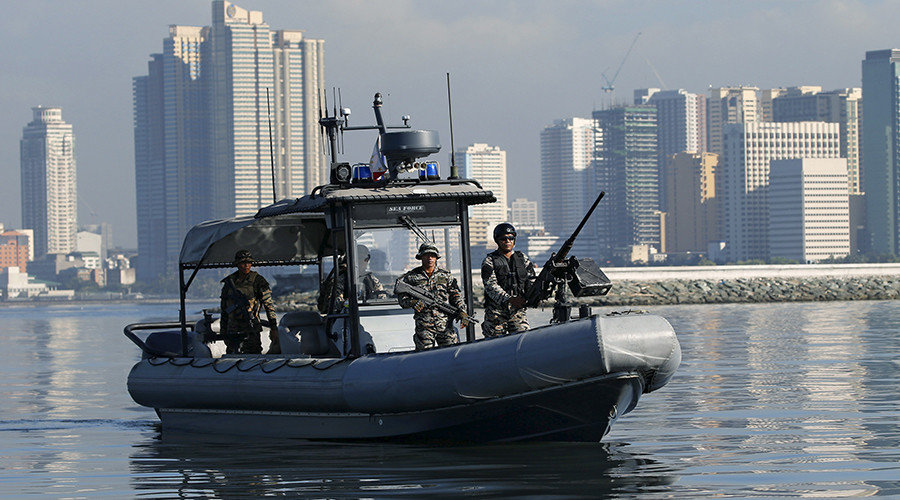Det asiske land kunne nu muligvis vende mod Kina og Rusland for at kunne erhverve nye våben så at det kan forbedre dets evner til at bekæmpe oprør og terrorisme i landet.
I april, begyndte den filippinske flåde fælles flådepatruljer i det Sydkinesiske Hav sammen med USA for at modsvare Kinas oprettelse af kunstige øer på omstridte rev.
Filippinernes Præsident Rodrigo Duterte, som har været klart kritisk af amerikanske sikkerhedspolitikker, erklærede i en televiseret tale tirsdag, foran militære officerer i Manila, et paradigmeskift i landets forhold med allierede.
"Vi afskærer ikke vores alliancer - såvel miltære (alliancer). Men vi vil klart forfølge et uafhængigt ståsted og en uafhængig udenrigspolitik," sagde Duterte.
Det første skridt for Filippinerne er at opte ud af amerikansk ledede patruljer i det Sydkinesiske Hav, fordi landet "vil ikke have problemer", sagde præsidenten og erklærede at hans flåde "ikke vil deltage i nogen ekspeditioner med at patruljere havene ... fordi jeg ønsker ikke at mit land bliver involveret i en fjendtlig handling."
Kommentar: Denne artikel er delvis oversat til dansk af sott.net fra: Duterte: Philippines will pursue policies independent of US, looks to acquire arms from China and Russia
The second step that Duterte hinted at was the ending of the Phillipino reliance on US weaponry by at least partially shifting the procurement of arms to Russia and China. Duterte said that the two countries had agreed to give the Philippines a 25-year soft loan to buy military equipment.
About 75 percent of the Philippines' arms imports since the 1950s came from the US, according to Stockholm International Peace Research Institute. Russia and China have since that time have been out of the loop.
In announcing a definite shift in defense policy, the president said that he wanted to buy arms "where they are cheap and where there are no strings attached and it is transparent."
"Let's contend ourselves with the propeller-driven planes but which we can use extensively in counter-insurgency," Duterte added. "I don't need jets, F-16 - that's of no use to us... we don't intend to fight any country."
The president said that Defence Secretary Delfin Lorenzana and"technical people" in the armed forces would visit China and Russia"and see what's best."
The shift in the country's foreign policy came a day after Duterte called for the withdrawal of US troops in Mindanao, supposedly to keep them from being killed by the terror group Abu Sayyaf. A limited US troop contingent was deployed to the country in 2002 to train, advise and provide intelligence and weapons to Filipino troops battling Al-Qaeda-linked militant group in the southern Philippines.
Presidential spokesman Ernesto Abella quickly jumped in to clarify that statement saying that the troop removal statement was just and"injunction" and a "warning" about the risks Americans face in Mindanao.
"Those statements are not policies set in stone," Abella said in a press briefing. "These are backgrounders for possible future action. There's a difference," he added.
The spokesman said that the Philippines would continue to honor agreements with the US such as the Enhanced Defense Cooperation Agreement (EDCA) and the Visiting Forces Agreement (VFA).
"We're not turning back on anybody. We are just charting an independent course," the spokesman said.
The country's Foreign Affairs Secretary Perfecto Yasay also clarified Duterte's message to US troops, saying: "There is no shift in so far as our policy is concerned with respect to our close friendship with the Americans."
State Department spokesman John Kirby said that Washington was aware of Duterte's comments, but was "not aware of any official communication by the Philippine government to that that effect and to seek that result."
Pentagon spokesman Commander Gary Ross meanwhile said that US-Philippine relationship "has been a cornerstone of stability for over 70 years."
"We will continue to consult closely with our Filipino partners to appropriately tailor our assistance to whatever approach the new Administration adopts," Ross said.




Kommentar: Se også: